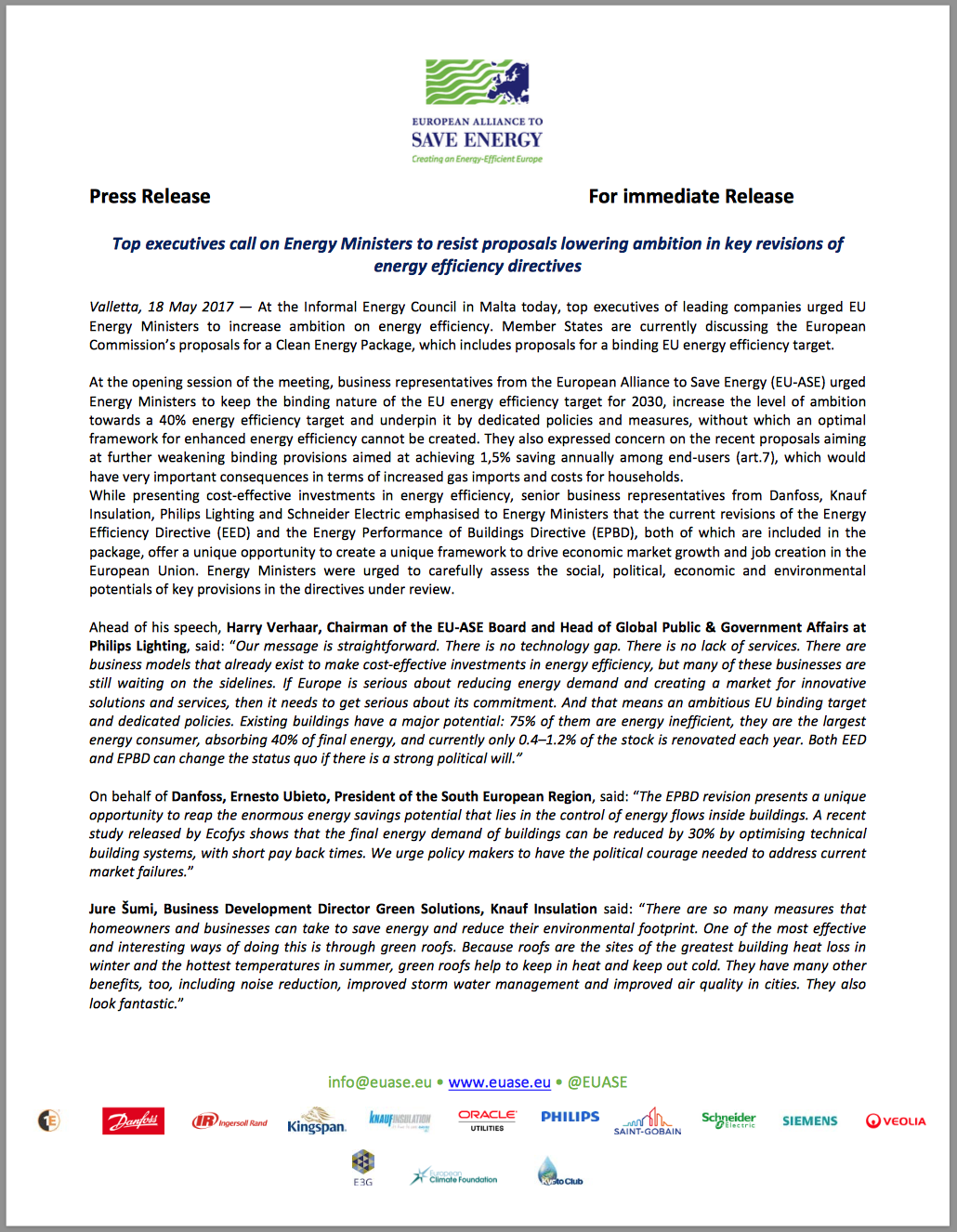
Valletta, 18 May 2017 — At the Informal Energy Council in Malta today, top executives of leading companies urged EU Energy Ministers to increase ambition on energy efficiency. Member States are currently discussing the European Commission’s proposals for a Clean Energy Package, which includes proposals for a binding EU energy efficiency target.
At the opening session of the meeting, business representatives from the European Alliance to Save Energy (EU-ASE) urged Energy Ministers to keep the binding nature of the EU energy efficiency target for 2030, increase the level of ambition towards a 40% energy efficiency target and underpin it by dedicated policies and measures, without which an optimal framework for enhanced energy efficiency cannot be created. They also expressed concern on the recent proposals aiming at further weakening binding provisions aimed at achieving 1,5% saving annually among end-users (art.7), which would have very important consequences in terms of increased gas imports and costs for households.
While presenting cost-effective investments in energy efficiency, senior business representatives from Danfoss, Knauf Insulation, Philips Lighting and Schneider Electric emphasised to Energy Ministers that the current revisions of the Energy Efficiency Directive (EED) and the Energy Performance of Buildings Directive (EPBD), both of which are included in the package, offer a unique opportunity to create a unique framework to drive economic market growth and job creation in the European Union. Energy Ministers were urged to carefully assess the social, political, economic and environmental potentials of key provisions in the directives under review.
Ahead of his speech, Harry Verhaar, Chairman of the EU-ASE Board and Head of Global Public & Government Affairs at Philips Lighting, said: “Our message is straightforward. There is no technology gap. There is no lack of services. There are business models that already exist to make cost-effective investments in energy efficiency, but many of these businesses are still waiting on the sidelines. If Europe is serious about reducing energy demand and creating a market for innovative solutions and services, then it needs to get serious about its commitment. And that means an ambitious EU binding target and dedicated policies. Existing buildings have a major potential: 75% of them are energy inefficient, they are the largest energy consumer, absorbing 40% of final energy, and currently only 0.4–1.2% of the stock is renovated each year. Both EED and EPBD can change the status quo if there is a strong political will.”
On behalf of Danfoss, Ernesto Ubieto, President of the South European Region, said: “The EPBD revision presents a unique opportunity to reap the enormous energy savings potential that lies in the control of energy flows inside buildings. A recent study released by Ecofys shows that the final energy demand of buildings can be reduced by 30% by optimising technical building systems, with short pay back times. We urge policy makers to have the political courage needed to address current market failures.”
Jure Šumi, Business Development Director Green Solutions, Knauf Insulation said: “There are so many measures that homeowners and businesses can take to save energy and reduce their environmental footprint. One of the most effective and interesting ways of doing this is through green roofs. Because roofs are the sites of the greatest building heat loss in winter and the hottest temperatures in summer, green roofs help to keep in heat and keep out cold. They have many other benefits, too, including noise reduction, improved storm water management and improved air quality in cities. They also look fantastic.”
Business representatives also backed introductory remarks by the European Commissioner for Climate Action & Energy, Miguel Arias Cañete, who defended the vision, ambition and coherence of the Commission’s proposals on EED and EPBD revisions presented on 30 November 2016.
The Informal High-Level Meeting on Energy Efficiency in the Mediterranean is taking place in the Grand Master’s Palace, Valletta (Malta) on 18 and 19 May. This two-day meeting gathers Energy Ministers and their delegations from the 43 States of the Union for the Mediterranean (UfM), i.e. EU28, North Africa and Mediterranean Middle East. It is co-organised by the European Commission (DG ENER and EEAS), the UfM, the Maltese EU Presidency and the Kingdom of Jordan.
Earlier this year, EU-ASE members issued a Position Paper with their views on the Clean Energy for All Europeans package and specific policy recommendations on the EED and EPBD.
